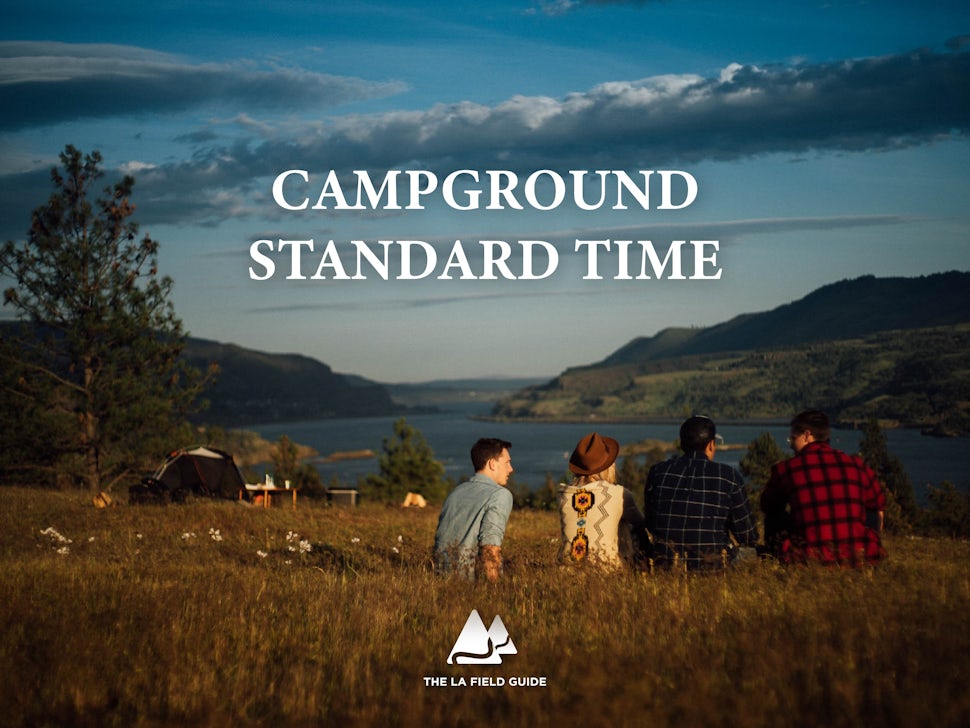Campground Standard Time
Most of us think of the time produced by our clocks as time itself. Camping offers us an alternate way of viewing time.

Do you ever pause and consider that time is a completely human invention? Yeah, that’s where my head is at this week. No, of course not actual time—that never ending unfolding series of now’s we all seem to find ourselves wandering about inside—but minutes and hours, weeks and years, all the ways we normally talk about time are all completely and arbitrarily figments of our own imaginations. British mathematician and Stanford researcher Keith Devlin explains it better than I ever could:
“Most of us think of the time produced by our clocks as time itself. Yet the only thing natural about the time produced by clocks is that it is originally based on a complete revolution of the earth (or more precisely, the average of such revolutions). The division of that period into 24 equal hours, the division of each hour into 60 minutes, and the further division of each minute into seconds are all human inventions.
In fact, there's a fundamental circularity in the way we measure time. The time that is measured by a clock is itself produced by that clock. Today we don't give this matter any thought—time is what the clock tells us. But in the early days of clocks that was not the case. Indeed, so different was the time determined by the clock that the practice developed of indicating when a time given was produced by the clock by adding the phrase ‘of the clock’—later abbreviated to the ‘o'clock’ we use today.
With the invention of the clock, the basic unit of time ceased to be the day and was replaced by the hour.”
Clocks produce the time they measure… if that blows your mind as much as it blows mine, you’ll probably enjoy reading his entire blog post on the subject. It got me thinking about one of the things I love so much about camping: it makes time disappear. Measuring days by the ticking of the clock is a habit that takes many people a long time to break, and for good reason. We are awakened by an alarm clock, we begin work at a predetermined hour, our meetings are dictated by the clock, we eat not when we are hungry but when it is time for lunch. Most of our days are structured down to the minute. It is truly incredible how out of touch we are with the natural progression of the day when we spend so much of it indoors staring at clocks.
On camping trips, I don’t care what a clock has to say about my day. I rely instead on my own intuition and observation—the old fashioned way. Camping doesn’t function on a schedule of minutes and hours so much as it functions on the momentary arising of needs and the slow evolution of the day. You wake up when it gets light out and your body decides it would like to be awake. You eat when you are hungry (or when you feel like it—it’s a vacation after all.) You drink when you are thirsty (or… okay you get it). You set up camp before it gets dark, you make sure you have a headlamp or flashlight on hand as twilight falls, and you go to the tent when the campfire burns out.
The sun’s journey across the sky is but the most elementary of time indicators, and even it can be life-changing to become aware of. The longer you give attention to the changes of the day, the more you begin noticing the subtlety and complexity present in the simple passage of time. You begin to notice how long before sunrise the birds begin singing. You start feeling the air warm and lift from its cool nighttime rest. You hear the cicadas welcome the afternoon and measure the air temperature as accurately as any thermometer with their droning. You wonder precisely how long after sunset the first stars are visible and realize it’s as much a feeling as it is a duration.
I am but an amateur natural time-teller; there is so much more to notice. Afternoons are the most difficult for me to discern, and many hours seem to pass after mid-day before I detect any hints of evening. I wonder what changes I am missing? At some point in the dusk, crickets begin chirping, though I haven’t been able to put my finger on precisely when they start. Even more mysterious to me is the hour when they turn in and leave the silent night to the owls.
Next time you go camping, take a minute or two as many times throughout the day as it comes to mind to notice the progression of the day you’re a part of. What does the passage of time sound like? Smell like? Feel like? When do you get hungry, or sleepy, or lethargic, or restless? I’ve started finding that the patterns I identify in myself on camping trips are the same patterns present in my everyday life, I’m just usually too busy checking the clock to notice them.
We want to acknowledge and thank the past, present, and future generations of all Native Nations and Indigenous Peoples whose ancestral lands we travel, explore, and play on. Always practice Leave No Trace ethics on your adventures and follow local regulations. Please explore responsibly!
Do you love the outdoors?
Yep, us too. That's why we send you the best local adventures, stories, and expert advice, right to your inbox.







